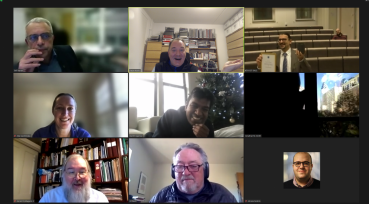At NSDI ’22, Waleed presented our RedN paper that shows a suprising result, namely that Remote Direct Memory Access (RDMA), as implemented in widely deployed RDMA Network Interface Cards, is Turing Complete. We leverage this finding to reduce the tail latency of services running on busy servers by 35x! Full Abstract is below, and the video is on the USENIX Youtube channel. This is joint work with Waleed Reda, Marco Canini (KAUST), Dejan Kostić, and Simon Peter (UW).
It is becoming increasingly popular for distributed systems to exploit offload to reduce load on the CPU. Remote Direct Memory Access (RDMA) offload, in particular, has become popular. However, RDMA still requires CPU intervention for complex offloads that go beyond simple remote memory access. As such, the offload potential is limited and RDMA-based systems usually have to work around such limitations.
We present RedN, a principled, practical approach to implementing complex RDMA offloads, without requiring any hardware modifications. Using self-modifying RDMA chains, we lift the existing RDMA verbs interface to a Turing complete set of programming abstractions. We explore what is possible in terms of offload complexity and performance with a commodity RDMA NIC. We show how to integrate these RDMA chains into applications, such as the Memcached key-value store, allowing us to offload complex tasks such as key lookups. RedN can reduce the latency of key-value get operations by up to 2.6× compared to state-of-the-art KV designs that use one-sided RDMA primitives (e.g., FaRM-KV), as well as traditional RPC-over-RDMA approaches. Moreover, compared to these baselines, RedN provides performance isolation and, in the presence of contention, can reduce latency by up to 35× while providing applications with failure resiliency to OS and process crashes.

